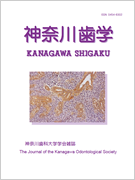- HOME
- > 一般の方
- > バックナンバー:神奈川歯学
- > 50巻2号
- > アブストラクト
アブストラクト(50巻2号:神奈川歯学)

English
| Title : | Intelligibility of medical terms among students at the School of Dentistry, Kanagawa Dental University |
|---|---|
| Subtitle : | ORIGINAL ARTICLE |
| Authors : | Nobuharu YAMAMOTO*, Tatsuo YAMAMOTO**,******, Mitsuyoshi KUBOTA*, Koji HANAOKA*, Akira SUGAYA*, Noriyuki YUYAMA*, Jota HAYASHIDA*, Koji KIMURA*, Hidefumi KUMADA*, Junghee YI*, Nanako SAKAI*, Masato KAWAKAMI*, Takashi SAKURAI*,*****, Keiichi TSUKINOKI***,*****, Yukio HIRATA**** |
| Authors(kana) : | |
| Organization : | *Department of Dental Education, Graduate School of Dentistry, Kanagawa Dental University, **Department of Dental Sociology, Graduate School of Dentistry, Kanagawa Dental University, ***Department of Oral Science, Division of Environmental Pathology and Oral Diagnostic Pathology, Graduate School of Dentistry, Kanagawa Dental University, ****Dean, Kanagawa Dental University, *****(Chief: Prof.), ******(Chief: A.Prof.) |
| Journal : | Kanagawa Shigaku |
| Volume : | 50 |
| Number : | 2 |
| Page : | 73-81 |
| Year/Month : | 2015 / 12 |
| Article : | Original article |
| Publisher : | Kanagawa Odontological Society |
| Abstract : | [Abstract] The scope of questions in the National Dentist Exam is updated every four years. In 2013, the year of changing, new sections regarding the oral cavity and systemic illness were added. Students must learn comprehensive medical knowledge, not limited to dentistry. Therefore, we conducted a survey on the intelligibility of medical terms pertaining to dentistry to grasp how much they understood general medical knowledge, in order to improve the quality of classes. Of 616 students in our faculty from the first to sixth grades, 591 students who gave consent were analyzed (collection rate: 96.1%). From questions in the National Dentist Exam, we extracted 100 medical-related terms, consisting of 36 in the field of etiology and clinical condition, 28 disease names, 10 in consultation, 10 in treatment, 5 in testing, 4 in normal, 3 in accidents, 3 in drugs, and 1 in prophylaxis, and asked them to choose from "I can explain", "I've heard", and "I don't know" on an answer sheet. The rate of choosing "I can explain" was defined as intelligibility. The most intelligible term was vomiting (86.6%), followed by dehydration, anemia, and diabetes mellitus. Conversely, disuse syndrome (15%) was the least intelligible, followed by collagenosis and perioperative period. Among the fourth, fifth, and sixth grade students who had completed the compulsory medical course, over 50% knew 83 of the 100 medical terms pertaining to dentistry (83%), clearly higher than 43 of the 100 terms (43%) among the first, second, and third grade students who had not taken the compulsory course; however, comprehensive intelligibility was lower than expected. The results of this study suggested that we must put greater emphasis on medical-related terms from questions in the National Dentist Exam in the compulsory medical course and clinical training. |
| Practice : | Dentistry |
| Keywords : | Education in dentistry, the National Dentist Exam, medical terms, intelligibility, survey by questionnaire |
